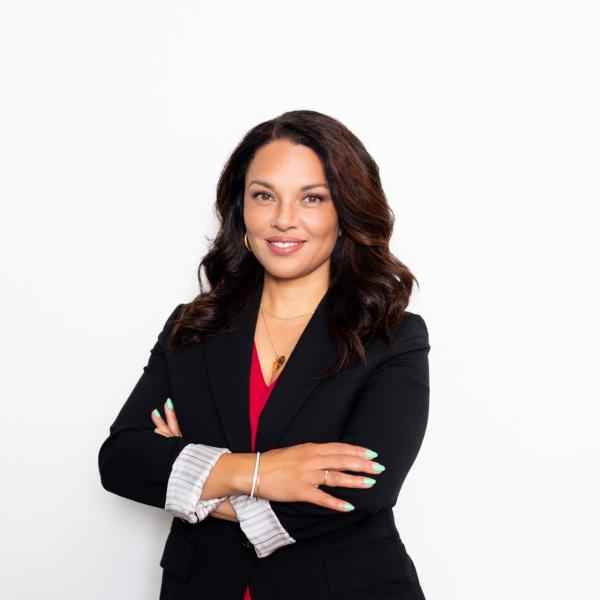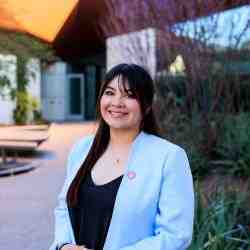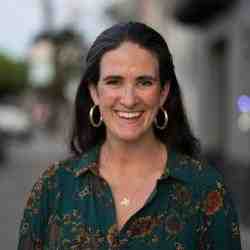前書き
Hillary Blout is fighting to break cycles of incarceration, poverty, and trauma in order to reunite families and repair communities for generations to come. Her innovative approach is to work with prosecutors—the powerful actors who sentence people in the first place—to bring people home from prison who are rehabilitated and do not pose a threat to public safety.
新しいアイデア
Hillary Blout’s For The People has created the first legal mechanism (starting in California, and now in four other states) for prosecutors to revisit and adjust their original recommended sentences after the fact – and works with counties across the United State to use this tool as a way to both (1) decarcerate tens of thousands of people serving time and (2) recruit prosecutors to participate in – rather than simply resist – criminal justice reform efforts nationwide.
Research shows that hundreds of thousands of those in prison could be safely released today. For some, their original sentence itself was too harsh based on current sentencing practices. For others, the sentence may have been reasonable, but the person has since transformed their life during incarceration, and the person does not pose a risk to public safety.
Hillary and her team at For The People are the architects of the nation’s first law that allows prosecutors—who usually send people to prison—to bring incarcerated people home. The organization’s larger vision is to cement nationwide policies that allow prosecutors to look back and reduce sentences as a standard practice. Until Hillary founded For the People, prosecutors neither had the inclination nor the legal pathways to revisit and revise sentences that on second glance were far too punitive to fit the crime. Now in a growing number of states, they do. For the People has passed new laws in five states to date and work with counties within those states to establish resentencing units that are responsible for re-examining sentences, and where relevant, recommending an adjustment or a commutation in front of a judge.
This means incarcerated people can have their sentences reevaluated and system leaders proactively find and free people from prison. This law fundamentally transforms the role of a prosecutor and lays the foundation for broader second-look reforms. For The People calls this tool “Prosecutor-Initiated Resentencing,” or PIR.
While reforms that prevent people from entering the prison system are essential, we also need solutions to bring people home from prison who are currently serving long, outdated sentences. We cannot allow people to unnecessarily languish behind bars – it’s not only unjust but also leads to adverse outcomes for incarcerated people, their children, their families, and communities at large. When you reunite families, you strengthen communities, which is the definition of public safety.
問題
The United States has the largest prison population of any independent democracy, and every year it spends $80 billion to lock up close to 2 million people in its jails and prisons. This alarming reality is a function of many reinforcing factors that have compounded over decades, starting with the “War on Drugs” in the 1970s and increasing with the passage of infamous “Three Strikes” laws in the 1990s wherein third offenses (no matter how minor) automatically triggered life sentences.
Even today, long sentences are imposed more frequently and are longer on average in the U.S. than in most other countries, according to the Council on Criminal Justice. Over the past few decades, as the prison population ballooned with each iteration of harsher criminal justice policies, so too did racial disparities within the prison system. (In just one example, Black males receive sentences 13.4 percent longer on average than white males.)
By the late 2000s, extreme overcrowding in prisons resulted in dangerous and unhealthy conditions. Gymnasiums were repurposed and lined with triple bunk beds just a few inches apart. Bathrooms were overrun with mold, human waste, and leaking pipes. Overcrowded prisons led to increased violence and made it impossible to provide adequate mental health and medical care to incarcerated people. Deteriorating infrastructure problems persist in prisons to this day.
Thankfully, there is a burgeoning movement to reform the criminal justice system. Many reforms rightfully address people entering the system, diverting them to other systems of accountability, and these are known as “front-end” reforms. While these are necessary to stem the flow of people going into prison, fewer reforms are aimed at helping the more than 1M people who are already in prison. “Back-end” reforms are efforts to release rehabilitated people who are languishing due to excessively long sentences – this is where Hillary and her organization For The People focus their efforts. Most current back-end efforts involve complex and lengthy legal procedures, often requiring relitigating decades-old cases, scientific analysis, case reconstruction, a committed bank of legal practitioners, or the successful advocacy of a Governor and their administration.
Despite their outsized power and discretion in the system, prosecutors have not typically been enlisted in these kinds of solutions – until now. In fact, the dominant practice among prosecutors across the United States is to push for the harshest, longest sentences possible for crimes committed, where convictions and length of sentences are perceived as “wins” for victims, sometimes at any cost. While many prosecutors are attracted to the profession out of a desire to work as champions for justice, the training and culture within many of their offices have historically defined public safety by a high number of convictions and long sentences. Due to this reputation, prosecutors are often excluded by those working to reform the criminal justice system, further entrenching all actors into their prescribed roles in our adversarial system.
戦略
After collaborating with legislators in California to secure the passage of AB 2942, the nation’s first PIR law, Hillary founded For The People to implement PIR laws and grow a national movement. Through PIR, a person’s sentence can go from a life sentence to an immediate release after one court appearance. An incarcerated person can be reunited with their family and a network of support in a matter of weeks.
Hillary and her team at For The People are implementing a three-part strategy with the ultimate goal of reaching a tipping point beyond which resentencing becomes an established norm and implemented best practice across the United States.
The first step involves passing PIR laws and supporting prosecutors to implement them. PIR laws have passed in five states (California, Oregon, Washington, Illinois, and Minnesota), and prosecutors have begun using alternative legal mechanisms to participate in resentencing in a handful of other states. PIR laws have been proposed in seven additional states, with more legislation on the horizon.
Through PIR, prosecutors look back at past sentences, a process which can ultimately affect how they make decisions looking forward. The PIR process—which involves learning about a person’s rehabilitation in prison and factors like their upbringing that may have led them to commit their offense—urges prosecutors to see a person’s humanity and consider all circumstances when recommending a new sentence.
Hillary and her team at For The People work closely with 20+ different jurisdictions across seven states to support the development of resentencing units – a 12 to 18-month process whereby For The People is a responsive collaborator, assisting in gathering incarceration data, defining resentencing criteria, training prosecutors and their staff on the resentencing process with the court, and working up cases when an office’s capacity to do so is limited.
The second step involves cultivating relationships with public defenders, community-based organizations, and reentry organizations. For The People assists with in-prison reentry planning and post-prison support to ensure that people are successful once they return to their communities. This support network reduces the likelihood of recidivism, which is critical to the expansion of PIR.
The third step involves scaling a public awareness campaign around the urgency of releasing people serving unjust and excessive sentences. This includes visual storytelling, short documentary filmmaking, a statewide campaign to look at women’s cases, and targeted media amplification. For The People shares second-chance stories from both formerly incarcerated people and the prosecutors whose lives have been changed by PIR in an attempt to uplift and humanize actors across the justice system.
To build credibility and awareness of PIR, For The People has also developed a range of other local and national partnerships. Some are with academic institutions, such as the University of California Davis School of Law, which hosts the nation’s first PIR clinic. For The People also partners with leading legal institutions, like the National District Attorneys Association. In 2023, the American Bar Association, the oldest national legal institution, adopted a resolution urging all governments to adopt PIR laws. For The People takes a bipartisan approach, and the team is deliberate to leverage data and build allies across the political spectrum. Red states are often the most important to enlist because they tend to have the most harmful prison conditions, harshest sentencing practices, and highest racial disparities.
So far, there have been over 1,000 people resentenced through PIR. Over the next 10 years, For The People will advance this movement across the nation to prioritize reuniting families. In the organization’s home state of California alone, the impact of achieving For The People’s goals would be significant and serve as a national model with rippling and compounding impacts. In a 2021 report, For The Peoples estimated that this law could help safely bring home nearly 26,000 people in California. PIR could lead to the reunification of tens of thousands of incarcerated people across California and is also a replicable model for the rest of the country. This means positively impacting thousands of people, with families made whole again, parents physically present for their children, and communities restored.
人
Hillary grew up in California’s Bay Area in a town called Pittsburg, a short drive from Oakland. She lived on a street known for high-traffic drug dealing. She saw friends sent to prison, murdered, or entrenched in cycles of addiction. She decided that if she ever made it out, she would become a public defender to protect the people she grew up with. Her dream was to help people who were misunderstood, devalued, and sent away without any acknowledgment of how the system had failed them.
In law school, Hillary met a Black prosecutor who argued that it was the prosecutor who held the most power – power that could be wielded to transform the criminal justice system. He urged Hillary to reconsider her career path. Soon, she was recruited into the San Francisco District Attorney’s office by then-DA Kamala Harris, who was implementing diversion efforts and racial bias training for police officers, among other innovations. Hillary began to see the many ways that change could come from within the system. Still, over the years, there were cases that kept her up at night – cases where the person was very young at the time of sentencing, had been given an unnecessarily long sentence, or was given an outdated sentence years ago. Hillary struggled especially with the number of Black and Brown people she saw go in and out of prison.
Eventually, she stepped away from this role to help implement an urgent reform initiative in California that helped people with low-level offenses return home from prison. She worked closely with community leaders and advocates, many of whom viewed prosecutors as “the problem” with little inclination to bring them into the solution. This was an “aha” moment for Hillary, who believed that she could leverage her experience as a prosecutor to build bridges and innovate.
Hillary speaks honestly about how easy it is for prosecutors to get sucked into the culture of winning cases at all costs – where beating the opposing counsel can overshadow the details of the case itself. In her role at For The People, Hillary leans into her own prosecutorial background to build trust with prosecutor partners. “I know what it’s like,” she tells them. “I’ve sat where you sit, and I understand the job’s challenges.” As Hillary and her team at For The People introduce more and more prosecutors to PIR, they strive to remind the prosecutors of the very nature of the role: prosecutors are supposed to administer justice fairly and compassionately, and they work for the people.



